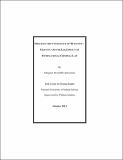| dc.contributor.advisor | William Schabas | |
| dc.contributor.author | McAuliffe deGuzman, Margaret M. | |
| dc.date.accessioned | 2015-02-18T13:02:10Z | |
| dc.date.issued | 2014-10-20 | |
| dc.identifier.uri | http://hdl.handle.net/10379/4869 | |
| dc.description.abstract | This thesis analyses the relationship between an idea and the legitimacy of an international regime. The idea, captured in the word "gravity", is that some crimes are so serious that they concern the entire world. That idea provides the central justification for the existence of the international criminal law regime and for many of its doctrines and policies. Legitimacy concerns the normative and sociological justifications for exercises of authority. The idea of gravity serves as the principal force seeking to legitimate the international community's authority to prescribe and adjudicate criminal conduct.
The thesis argues that international criminal law's reliance on gravity for its legitimacy is problematic because the concept lacks clear, agreed content. This ambiguity has served a constructive function in the regime's establishment and early years because it facilitates consensus. Regime founders and actors can agree to particular actions, such as the establishment of the International Criminal Court, based on a shared commitment to the vague goal of ending impunity for especially serious crimes. Such agreements, however, mask unresolved conflicts regarding global values and priorities. For instance, as the controversies surrounding the work of the ICC reveal, there is limited consensus about when international adjudicative authority should be given priority over national adjudicative authority. The aim of this thesis is to expose gravity's role in masking such conflicts and to suggest a new approach to gravity-oriented decisions that better promotes the legitimacy of the international criminal law regime.
The thesis begins by defining the key terms of "legitimacy" and "gravity" and briefly explaining how gravity seeks to legitimate the international criminal law regime. Next, it reviews the history of the regime to show how gravity came to play the central justificatory role that it does today. The thesis then examines the principal theories of international crimes to demonstrate the ambiguity of gravity as a justification for international prescriptive authority. Thereafter, the thesis explores how the concept of gravity informs evaluations of the legitimacy of international adjudication as well as adjudication of international crimes in national courts under the theory of universal jurisdiction. Finally, the thesis proposes a novel approach to operationalizing gravity as a justification for international adjudication that would better promote the legitimacy of the international criminal law regime than current approaches. | en_US |
| dc.rights | Attribution-NonCommercial-NoDerivs 3.0 Ireland | |
| dc.rights.uri | https://creativecommons.org/licenses/by-nc-nd/3.0/ie/ | |
| dc.subject | International criminal law | en_US |
| dc.subject | International criminal court | en_US |
| dc.subject | Legitimacy | en_US |
| dc.subject | Gravity | en_US |
| dc.subject | Irish Centre for Human Rights | en_US |
| dc.title | Shocking the conscience of humanity: Gravity and the legitimacy of international criminal law | en_US |
| dc.type | Thesis | en_US |
| dc.local.note | This thesis explores how the concept of gravity informs evaluations of the legitimacy of international criminal courts and the decisions they make. It proposes a novel approach to operationalizing gravity as a justification for international adjudication that would better promote the legitimacy of the international criminal law regime than current approaches. | en_US |
| dc.description.embargo | 2021-11-09 | |
| dc.local.final | Yes | en_US |
| nui.item.downloads | 191 | |


